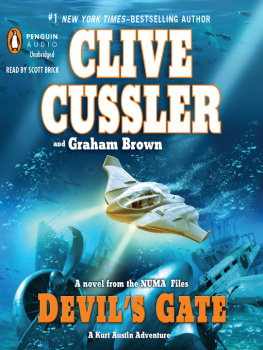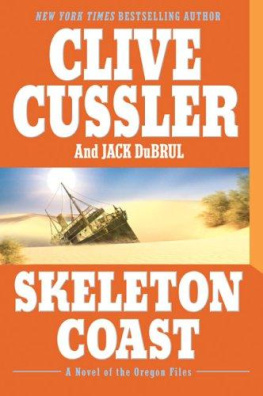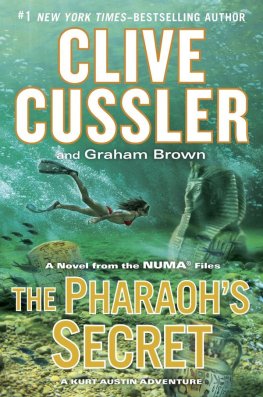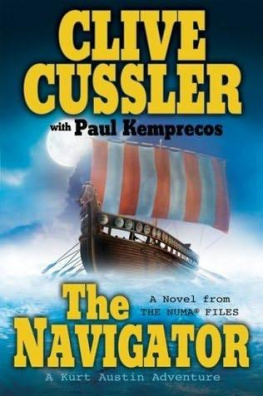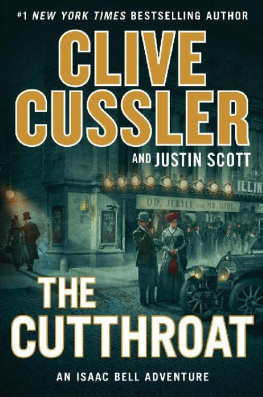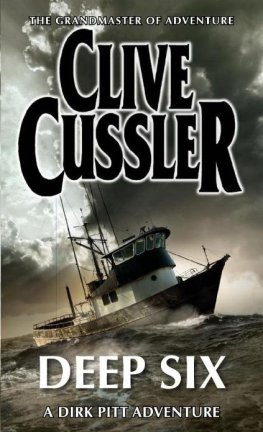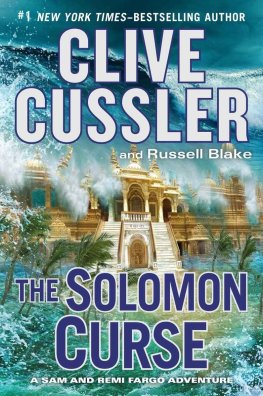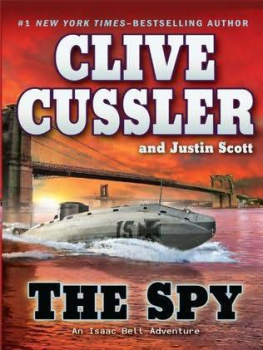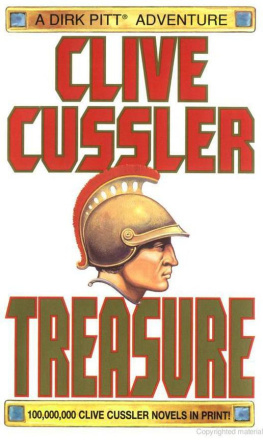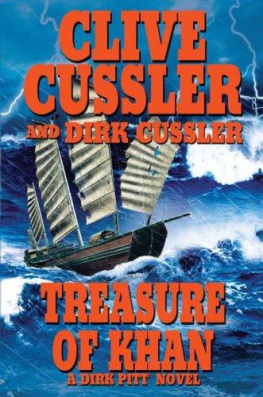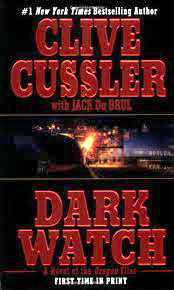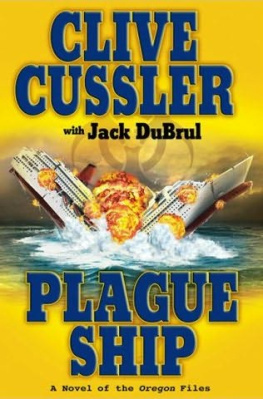Clive Cussler - Treasure
Here you can read online Clive Cussler - Treasure full text of the book (entire story) in english for free. Download pdf and epub, get meaning, cover and reviews about this ebook. genre: History. Description of the work, (preface) as well as reviews are available. Best literature library LitArk.com created for fans of good reading and offers a wide selection of genres:
Romance novel
Science fiction
Adventure
Detective
Science
History
Home and family
Prose
Art
Politics
Computer
Non-fiction
Religion
Business
Children
Humor
Choose a favorite category and find really read worthwhile books. Enjoy immersion in the world of imagination, feel the emotions of the characters or learn something new for yourself, make an fascinating discovery.

- Book:Treasure
- Author:
- Genre:
- Rating:3 / 5
- Favourites:Add to favourites
- Your mark:
- 60
- 1
- 2
- 3
- 4
- 5
Treasure: summary, description and annotation
We offer to read an annotation, description, summary or preface (depends on what the author of the book "Treasure" wrote himself). If you haven't found the necessary information about the book — write in the comments, we will try to find it.
Treasure — read online for free the complete book (whole text) full work
Below is the text of the book, divided by pages. System saving the place of the last page read, allows you to conveniently read the book "Treasure" online for free, without having to search again every time where you left off. Put a bookmark, and you can go to the page where you finished reading at any time.
Font size:
Interval:
Bookmark:
TREASURE
BY CLIVE CUSSLER
Books by Clive Cussler
Sahara
Dragon
Treasure
Cyclops
Deep Six
Pacific Vortex
Night Probe!
Vixen 03
Raise the Titanic!
Iceberg
The Mediterranean Caper
POCKET BOOKS New York London Toronto Sydney Tokyo Singapore POCKET BOOKS, a division of Simon & Schuster Inc. 1230 Avenue of the Americas, New York, NY 10020
Copyright (D 1988 by Clive Cussler Enterprises, Inc.
All rights reserved, including the right to reproduce this book or portions thereof in any form whatsoever.
for information address Simon & Schuster Inc., 1230 Avenue of the Americas, New York, NY 10020
ISBN: 0-671-70465-6
First Pocket Books printing November 1988
10 9 8 7 6 5 4 3 2 1
POCKET and colophon are registered trademarks of Simon & Schuster Printed in the U.S.A.
A NOTE TO THE READER
Please forgive the inconvenience of converting measurements from what most Americans are used to. But in 1991 the United States finally became the last nation on earth to convert to the metric system.
It's easy.
1 kilometer roughly equals a little more than 1/2 Mile.
1 meter is slightly more than a yard, about 39 inches.
THE ALEXANDRIA LIBRARY truly existed, and if it had remained unravished by wars and religious zealots it would have given us not only the knowledge of the Egyptian, Greek and Roman empires, but those little-known civilizations that rose and fell far beyond the shores of the Mediterranean.
In A.D. 391 Christian Emperor Theodosius ordered all books and art depicting anything remotely pagan, which included the teachings of the immortal Greek philosophers, burned and destroyed.
Much of the collection was thought to have been secretly saved and spirited away. What became of it, or where it was hidden, remains a mystery sixteen centuries later.
THE PRECURSORS
July 15, A.D. 391
A land unknown A small, flickering light danced eerily through the black of the tunneled passageway. A man dressed in a woolen tunic that dropped below his knees paused and raised an oil lamp above his head.
The dim glow illuminated a human figure inside a gold-and-crystal casket while casting a grotesque, wavering shadow against the smoothly cut wall behind. The man in the tunic stared into the sightless eyes for a few moments, and then he lowered the lamp and turned away.
He studied the long line of stationary forms that stood in deathlike silence, so great in number they seemed to trail off into infinity before vanishing in the darkness of the long cavern.
Junius Venator moved on, his strap sandals scraping over the uneven floor with a bare whisper of sound. Gradually, the tunnel widened into a vast gallery. Soaring to a height of nearly thirty feet, the domed ceiling was divided by a series of arches to give it structural strength. Gutters carved in the limestone spiraled down the walls so water seepage could run into deep drainage basins. The walls were laced with cavities filled with thousands of strange-looking circular containers made of bronze. Except for the large wooden crates stacked uniformly in the center of the carved chamber, the forbidding place might have been mistaken for the catacombs beneath Rome.
Venator peered at the copper tags attached to the crates, checking their numbers against those on a scroll he flattened on a small folding table.
The air was dry and heavy, and sweat began to course through the layers of dust that blanketed his skin. Two hours later, satisfied everything was catalogued and in proper order, he rolled up the scroll and slid it into a sash at his waist.
He took one final, solemn look at the objects in the gallery and exhaled a sigh of regret. He knew he would never see or touch them again.
Tiredly, he turned, held the little lamp in front of him and retraced his steps through the tunnel.
Venator was not a young man; he was approaching his fifty-seventh year.
tired dragging steps reflected the weariness of a man who had no more heart for life. And yet, down deep, he felt a glow of warmth it-from an inner satisfaction. The immense project was successfully completed; the great burden lifted from his bent shoulders. All that remained for him was to survive the long voyage to Rome.
He passed four other tunnels leading off into the hill. One had been blocked off by a great pile of rubble. Twelve slaves excavating deep inside had perished when the roof collapsed.
They were still in there, crushed and buried where they fell.
Venator felt little remorse. Better for them to have died quickly than suffer years of misery in the mines of the Empire on a bare subsistence diet before dropping from disease or being abandoned when they were too old to work.
He took the far passage on the left and walked toward a pale glimmer of daylight. The entrance shaft had been hand-cut inside a small grotto and measured two-and-a-half meters in diameter-just wide enough to permit entry of the largest crates.
Suddenly the sound of a faraway scream echoed down the shaft from the outside. A frown of concern furrowed Venator's forehead, and he increased his pace. Out of habit he squinted his eyes against the brilliance of the sun as he stepped into its light. He hesitated and studied the camp that lay a short distance away on a sloping plain. A group of Roman legionaries stood around several barbarian women. One young girl screamed again and tried to scramble away. She almost broke through the cordon of soldiers, but one of them grabbed her by her long flowing black hair. He pulled her back, and she stumbled to her knees in the coarse dirt.
A huge, hard-bitten character spied Venator and approached. The man was a giant, standing a good full head above everyone else in camp, with great shoulders and hips joined nearly as one, and a pair of oak-beam arms ending in hands that dropped almost to his knees.
Latinius Macer, a Gaul, was the chief overseer of the slaves. He waved a greeting and spoke in a voice that was surprisingly high-pitched.
"Is all in readiness?" he asked.
Venator nodded. "The tally is finished. You can seal off the entrance."
"Consider it done."
"What is the disturbance in camp?"
Macer glanced at the soldiers, peering through black, cold eyes, and spat on the ground. "Stupid legionaries became restless and raided a village five leagues north of here. The massacre was senseless. At least forty barbarians were killed. Only ten were men, the rest women and children. And for no good reason. No gold, no booty worth mule dung. Returned with a few ugly women to gamble over. Little else."
Venator's face tensed. "Were there any other survivors?"
"I was told two of the men escaped into the brush,"
"They will sound the alarm in other villages. I fear Severus has kicked a hornet's nest."
"Severus!" Macer spat the word in unison with another salvo of saliva.
"That damned centurion and his lot do nothing but steep and drink our wine supply. A pain in the buttocks to bring the lazy baggage along, in my judgment."
"They were hired to protect us," Venator reminded him.
"from what?" Macer demanded. "Primitive heathen who eat insects and reptiles?"
"Gather the slaves and seal off the tunnel quickly. And make a good job of it. The barbarians must not be able to dig through after we leave."
"Little fear of that. from what I've seen, no one around this cursed land has mastered the art of metalworking." Macer paused and pointed to the massive heap of excavated takings poised above the entrance to the shaft, precariously held in place by a giant crib of logs. "Once that falls, you can stop worrying about your precious antiquities. No barbarian will ever get to them. Not by scratching with his bare hands."
Reassured, Venator dismissed the overseer and strode angrily toward the tent of Domitius Severus. He passed the personal emblem of the military detachment, a silver symbol of Taurus the bull atop a lance, and brushed aside the sentry who attempted to block his passage.
Next pageFont size:
Interval:
Bookmark:
Similar books «Treasure»
Look at similar books to Treasure. We have selected literature similar in name and meaning in the hope of providing readers with more options to find new, interesting, not yet read works.
Discussion, reviews of the book Treasure and just readers' own opinions. Leave your comments, write what you think about the work, its meaning or the main characters. Specify what exactly you liked and what you didn't like, and why you think so.

